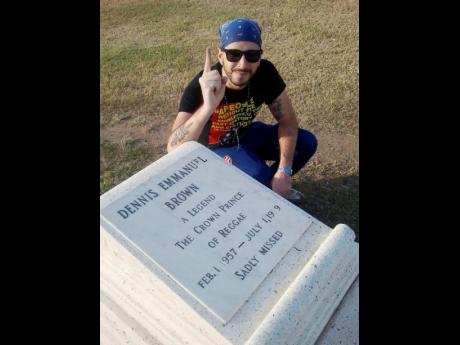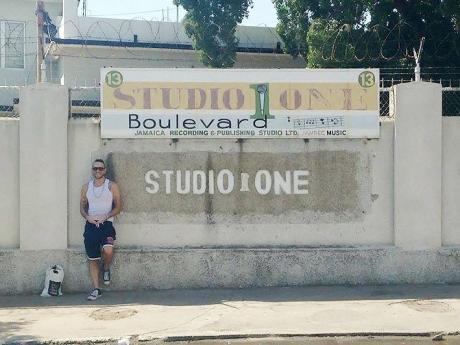Vinyl in vogue but Jamaica losing out - Global market for re-pressed reggae records
United Kingdom-based vinyl collector and re-presser Alex Caramellino, also known as Jah Fingers, is lamenting the fact that Jamaica seems to be in a deep sleep as far as the viability of the vinyl records industry is concerned. “In the ‘60s, ‘70s, and ‘80s, Jamaica had a strong music industry with some of the biggest pressing plants for vinyls. But with the advent of MP3, file-sharing, and [the] Internet, everybody got excited and enjoyed the idea of music for free,” he told The Sunday Gleaner. “So dem mek funeral for the vinyl music industry and dash way the stamper and leave the equipment in the pressing plant to rust,” Jah Fingers said.
WRONG MOVE
But the passage of time has shown, he said, that it was a wrong move. Vinyl is again in vogue, but in Jamaica, there are hardly any physical record-making plants, record stores, or record buyers. Simply put, in what was once the land of vinyl, vinyl is worthless. The British Phonographic Industry reported that in the UK, the sales of vinyl LP increased for 12 consecutive years, with 2019 marking the highest level of demand since the early 1990s.
“People start to realise that they feel better having a physical product that they can take home and put on a shelf and show to their children and even sell back,” Jah Finger, who has been in the vinyl re-pressing business for ten years explained. But, he pointed out that the original game-changers refuse to acknowledge that this market exists and have so far failed to take advantage of it. “I don’t understand it. When I go to these producers in Jamaica and ask for a licence to re-press 500 copies of an out-of-print vinyl, they ask me if there’s still a market for these records. Of course! Even the little pickney who born inna China know about Joe Gibbs and Coxsone and Studio One,” he said, adding that in his business, people keep asking for records from those producers, but they have stopped pressing.
“People are seeing the songs on Youtube, but where is the product? People come into Supa Tone, a record store in the UK that has been around from 1984, and they say, ‘Can I get Sugar Minott Mr DC?’ for example, but the producers stop pressing those records. When I started in this business, I didn’t have any money. I got a loan from my ex-girlfriend, and now I have 200 tunes in my catalogue, and I can look after my family of four in an expensive city like London,” he told The Sunday Gleaner.
Jah Fingers shared that there is a vinyl market for roots reggae, nyabinghi, and gospel reggae, and although it is not a billion-dollar industry, “nuff people in the business can eat a food”.
How it works is that he identifies a song that is in demand, searches for the producer and the artiste, pays for a licence to re-press a certain number of copies, and then sells these in-demand products. “A new 45 sells for on average £10 and an LP for £15 to £20, but if you have a record that is out of print and is strictly a collector’s item, that record can sell for up to £500,” Jah Finger shared.
He was also quick to point out that sometimes, the search for these producers and artistes is like trying to find a needle in a haystack, and another problem is that these producers sometimes have no idea where to find the original tape of the recording. “A man will tell yuh that him go sleep at one of him baby mada house and carry the tape with him. Next morning him and she get inna argument, and she mash up the tape. A nuh joke ting, man. Me hear plenty story like that,” he said.
He then takes it upon himself to track down a clean copy of the original and uses that to re-press, once he has secured the licence. Jah Fingers urged producers to ensure that they have goods roots reggae in their catalogue because of the demand for this enduring type of Jamaican music. He gave the example of a female singer named Sharon Little, who did “a beautiful roots reggae song” titled Don’t Mash Up Creation, decades ago, and in response to a growing demand for that track he eventually tracked down Little, living in Kingston, with no idea that anybody even remembered about Don’t Mash Up Creation. A quick look at YouTube showed that the song was uploaded in 2015 and has close to four million views, with 282 positive comments in about ten different languages and from places including Turkey and Russia.
Among the comments were: “Definitely on my want list ... not a reissue. $500!! Great Reggae before the computers took control!” Another said, “Hail up sister Sharon Little. I love my copy on 12 inch. Original. Had two copies gave one to my mate. Now it’s repressed. Bless.”
And while Little’s wasn’t a hard-luck story, there are other artistes whose lives are changed when they hear about their songs being in demand. “So many times they tell me, yuh know how long a waiting for this call.”
One such was singer Yvonne Sterling, whose plight was highlighted recently when her house was flooded out by the recent heavy rains. Sterling is best known for the song If You Love Me (Let Me Know), however, for fans on the continent, it is a single titled Oh Jah that put Sterling on the map and tucked her away in their hearts. “It is one of the most beautiful reality songs ever done,” Jah Fingers said. Two years ago, he finally found Yvonne Sterling and was able to assist her financially through re-pressing Oh Jah. Upon hearing of her situation, Jah Fingers set up a GoFundMe, with a goal of £1,000, to help Sterling.
For re-pressed songs, the market is growing. “Europe, South America, and Japan are all into roots reggae, but Russia and Poland start buying reggae to. And India start get a few sound systems, which I can’t believe,” Jah Fingers shared.
He sees himself as the link between the producers, the artistes, and the market. “Over the years, I have built up a trust among the people, and that is the greatest thing. If I get a licence to re-press 500 copies of a record, when that sell off, I go back to the producer to renew it even though I have the stamper and could just cut more tune. But if I am honest, what is due to me, I will get. And it is only right for people to get money from their labour. Some of these artistes were not even paid for the original tune, so I feel good that at last, they are getting something,” he said.



